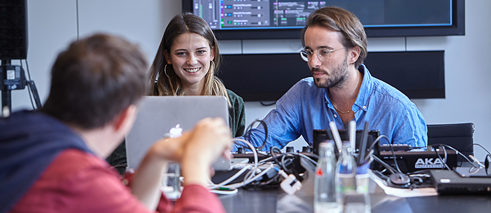Music for Movies
Surprise me!

Film music is a mixture of arts and crafts whose composition can be learned, also at German universities. It may be heard in concert halls and at trade fairs like the Soundtrack Cologne as well as on screens and monitors. An introduction.
There are the big names that light the way home from Hollywood: Hans Zimmer in particular, the film music guru from Frankfurt am Main; Harold Faltermeyer, a Munich resident with a reputation for international hits; and Klaus Doldinger, the doyen of the business whose chief domicile is at Lake Starnberg. They are the grandees of an era that thought in terms of big productions and liked to create orchestral and ambitious hymns for the world of images, which also acted on that world. But the business has changed.
“The means of production are now relatively unimportant”, says Gerd Baumann, Professor of Film Music at the Munich Academy of Music and Theatre. “Everyone can make excellent recordings at home, which is both advantage and disadvantage. What you would have needed an expert for twenty years ago can be done today by using simple means. The question is where the development taking us? The television of yesteryear is slowly disappearing; Netflix & company are now shaping consumption. Behind them are other financiers who are often much more flexible in their tastes. This has opened wide a good deal; you speculate about everything you can do with other musics, noises, things in the electronic field, even with limited means. And this has brought forth directors, producers and editors who are open to experimentation.”
Structural change with options
The demands and valuations addressed to composers and musicians have fundamentally changed in parallel with the structural change in the media world. While Enjott Schneider, Baumann’s predecessor in the Munich professorship, still complained in his foundational article “Filmmusik in Deutschland” (2001) (Film Music in Germany) that, with a few exceptions, “film music in Germany is stamped by of ‘illiteracy’ and ‘amateurism’”, his successor sees the situation differently: “The classic film composer, who sits in front of orchestra scores and uses only a certain style as a rubber stamp, is slowly dying out. The genres are being blown up; many directors are searching for the ‘Surprise me!’ effect. And that is felt as a challenge precisely by trendsetters who like experimenting.”This can happen autodidactically in the small home studio as well as in connection with comprehensive academic study such as is offered at, in addition to private institutes and the academy in Munich, the Konrad Wolf Film University Babelsberg in Berlin by Ulrich Reuter and at the Film Academy Baden-Württemberg in Ludwigsburg by Florian Dittrich and Andreas Fuchs. While the latter pays particular attention to production and sound design, the former focuses on musical education, ranging from classical music to conducting. In Munich, there are also numerous cooperations with the University of Television and Film, so that students from different departments can exchange ideas at an early stage of their own development: “Ultimately, you are most likely to survive if you are very versatile, networked and want to deal with subjects and people that go far beyond the actual commissions.”
Routine and creativity
Composers and directors, producers and editors, usually work closely together in film and in the broader medium of television. The rule is that the sooner a composer is engaged in the production process, the more comprehensively he can contribute to the design. Because the enemy of creativity is called the temp track. These are preliminary music sequences that are used instead of the final music in the editing of visual material. If they are too dominant or if those involved get too used to them, the temp tracks are often difficult to get rid of later. Apart from this, there are no clear guidelines for cooperation. “Some directors give specific details; some want to have a theme for only certain storylines or characters and otherwise give composers a free hand. Mainly it’s a process of convergence, because the first suggestion seldom ends up in the movie”, says Verena Marisa, who has composed music for the TV thriller series Tatort.If you remain flexible, she adds, it is quite possible to gain a foothold in the German film music scene: “You can live from it, but it involves a factor of chance. You can’t then always write the most demanding music you can do, but it’s possible. And you don’t need an orchestra right away, you can work with samples. After all, you don’t hear to the music as if it were played on a cinema’s audio system.”
In addition to effective self-organization, institutions like the German film composers’ trade union Defkom are helping the profession, which has been little organized for many years, to develop further. Its website lists and links around 140 film composers, and its German Film Music Prize and the Best Music Award for a Documentary Film, awarded every year by the DOKFest in Munich, help raise awareness of the profession beyond its niche.
There is also “Soundtrack Cologne”, an industry fair, which every August, in addition to giving workshops in composing for film, television and games, discusses legal issues, helps the community in networking and awards prizes such as the Peer Raben Music Award. The Film Music Days Halle celebrates the industry in the form of a sound event, and there are numerous concerts nationwide where film music is on the programme. Training and organization in film music in Germany has been professionalized, but in terms of content and artistic appreciation, according to Marisa, a good deal of development is still possible: “In contrast to American series, for example, where the music can becomes so important to the action in the film that it almost takes the lead for minutes on end, in German television or film it’s usually subordinated to the images. The scope of a composer’s freedom is much smaller; there’s still room for improvement.”